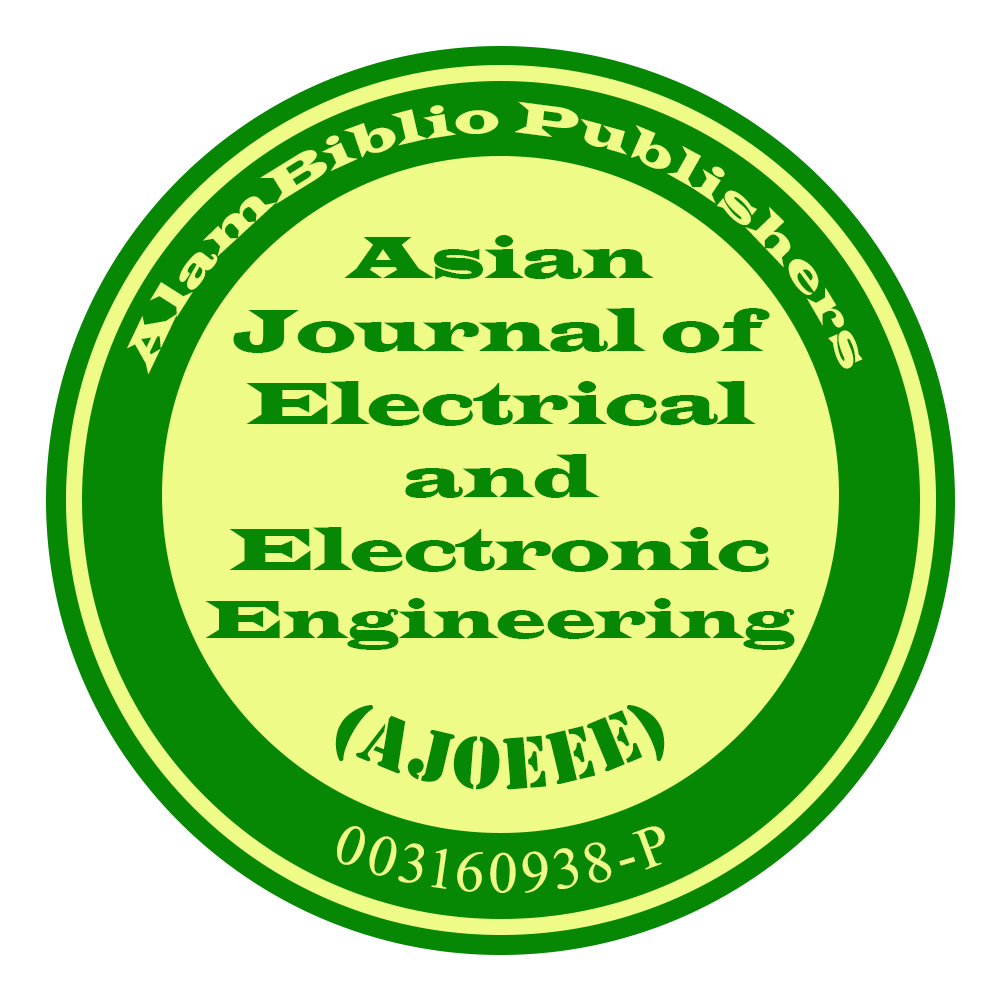Performance Prediction of D.C. Motor Fed From Half-Controlled Bridge Rectifier
DOI:
https://doi.org/10.69955/ajoeee.2023.v3i2.47Keywords:
DC motor, speed control, 3-phase half-controlled bridge rectifier, discontinuous conductionAbstract
Controlled rectification is the process of obtaining a controlled output DC voltage from a constant AC voltage. This can be used in the speed control of the DC motor to provide rapid torque control and a quick starting response. In this work, a three-phase half-controlled bridge rectifier has been used. The average output DC voltage varies smoothly by varying the firing angle (α). Different methods of analysis such as state-space and Fourier-series, are used to obtain the performance of the DC motor fed from the bridge-rectifier supply. However, these methods do not deal with the prediction of the discontinuous conduction phenomenon which occurs during the operation of the DC motor with a variation of delay angle. This paper deals with the prediction of performance characteristics during the operation of the DC motor fed by a 3-phase half-controlled bridge rectifier, including the transient as well as steady-state operation with a variation of delay angle as well as application of load torque at starting.
Downloads
References
M. Bogumila, " Modeling and Fuzzy Control of DC drives", 14th European Simulation Multi-Conference ESMC2000, Ghent, PP186-190, May 23-26,2000. https://www.academia.edu/1813510
PC Sen., " Principles of electric machines and power electronics", John Wily and Sons, New York, 2014. https://www.amazon.com/Principles-Electric-Machines-Electronics-Second/dp/0471022950
C. K.Venkateswarlu, and C. Chengaiah,” Comparative study on dc motor speed control using various controllers”, Journal of Research directions, volume 3, issue 1, pp6918-6925, Dec 2014. https://www.ijareeie.com/upload/2014/january/38_-COMPARATIVE.pdf
G.C.Ioannidis, C.S.Psomopoulos, S.D.Kaminaris, P.Pachos, H.Villiotis, S.Tsiolis, P.Malatestas, and G.A.Vokas, “AC-DC & DC-DC converters for dc motor drives”, Proceedings of the International Conference on Electronics and Communication Systems, 2013. https://www.researchgate.net/publication/249993508
O. A. Alnathee,” Performance of DC Motor Supplied From Single Phase AC-DC Rectifier”, Power Electronics and Drives, Chapter Thirteen. https://www.philadelphia.edu.jo/academics/mlazim/page.php?id=13
R. Gupta, R. Lamba, and S. Padhee,” Thyristor Based Speed Control Techniques of DC Motor: A Comparative Analysis “, International Journal of Scientific and Research Publications, Volume 2, Issue 6, pp1-6, June 2012. https://www.academia.edu/10629633
S. Shastri, and P. Pandey,” A Comparative Analysis of Firing Angle Based Speed Control Scheme of DC Motor”, International Journal of Engineering Research and Applications (IJERA), Vol. 3, Issue 4, pp.232-235, Jul.-Aug 2013. https://www.ijera.com/papers/Vol3_issue4/AM34232235.pdf.
D. Jaykishan, H. Moradiyal, and N. B. Danidhariya,” Design and Simulation of Closed Loop Speed Control of DC Drive by Using Dual Converter”, Volume 1, Issue 3, April 2014. https://doi.org/10.21090/IJAERD.010330 DOI: https://doi.org/10.21090/IJAERD.010330
R. Gupta and Ruchika,” Thyristor Based DC Motor Control with Improved PF & THD”, Vol. 5, No. 4, pp 519-536, December 2013. http://www.ijeei.org/docs-86020688652d3da2bbb032.pdf; https://doi.org/10.15676/ijeei.2013.5.4.10 DOI: https://doi.org/10.15676/ijeei.2013.5.4.10
H.F Soliman, and A.M Sharaf,” An incremental fuzzy logic controller for separately excited dc motor-rectifier fed drive system”, IEEE Canadian Conference of Electrical and Computer Engineering, Vol.1, 1994. https://doi.org/10.1109/CCECE.1994.405656 DOI: https://doi.org/10.1109/CCECE.1994.405656
BK. Bose,” Power electronics and motor drive recent technology advance “, Proceeding of IEEE International Symposium on Industrial Electronics, pp22-25, 2002. https://doi.org/10.1109/ISIE.2002.1026036 DOI: https://doi.org/10.1109/ISIE.2002.1026036
F. Song, Y. Zhang, Q. Tang, and L. Yaohua,” Research on three-phase controlled rectifier bridge load simulation method”, IEEE 11th Conference on Industrial Electronics and Application (ICIEA), 2016. https://doi.org/10.1109/ICIEA.2016.7603709 DOI: https://doi.org/10.1109/ICIEA.2016.7603709
R. G. Kanojiya, and P.M. Meshram,” Optimal tuning of PI controller of speed control of dc motor drive using practical swarm optimization”, APCET, 2012. https://doi.org/10.1109/APCET.2012.6302000 DOI: https://doi.org/10.1109/APCET.2012.6302000
Y. A. Almatheel, and A. Abdelrahman, ” speed control of dc motor using fuzzy logic controller”, International Conference on Communication Control Computing and Electronic Engineering (ICCCCEE), 2017. https://doi.org/10.1109/ICCCCEE.2017.7867673 DOI: https://doi.org/10.1109/ICCCCEE.2017.7867673
C. Rajeswari, G.Sundradevi, A.Siva.Sankar, and C.Kokila, ” Obtaining step response with small settling time using a fuzzy logic controller for separately excited dc motor” International Conference on Recent Advancement in electrical Electronic and Control Engineering, 2011. https://doi.org/10.1109/ICONRAEeCE.2011.6129815 DOI: https://doi.org/10.1109/ICONRAEeCE.2011.6129815
M. Daigavane, H. Suryawanshi, and J. Khan, “A Novel Three-Phase Series-Parallel Resonant Converter Fed DCDrive System”, Journal of Power Electronics, Vol. 7, No. 3, pp. 222-232, July 2007. https://www.koreascience.or.kr/article/JAKO200725522660230.page.
W. Phyo Aung, “ Analysis on Modeling and Simulink of DC Motor and its Driving System Used for Wheeled Mobile Robot”, World Academy of Science, Engineering and Technology 32, pp. 299-306, 2007. Corpus ID: 14196499.
Gelen, and S. Ayasun, “ Effects of PWM chopper drive on the torque-speed characteristic of DC motor”, 43rd International Universities Power Engineering Conference, 2008. https://doi.org/10.1109/UPEC.2008.4651640 DOI: https://doi.org/10.1109/UPEC.2008.4651640
C.S. Sharma, K. Singh, and R. Tamrakar,” A Thyristor Based Speed Control Techniques Of Separately Excited Dc Motor”, International Journal of Scientific Development and Research (IJSDR), Volume 1, Issue 11,pp13-25, November 2016. https://www.ijsdr.org/papers/IJSDR1611003.pdf.
Tariq, M. F. Jalil, M. T. S. Beg, and M. A. Husain, “Simulation and Performance Analysis of a Thyristor Controlled d.c. Motor Drive”, International Conference on Emerging Trends in Engineering and Technology, College Of Engineering, Teerthanker Mahaveer University, 2012. https://www.researchgate.net/profile/Mohammed-Husain-3/publication/280614000.
Ellis, and Giritharan,” Simulation and Analysis of Full Wave Bridge Rectifier Connected to DC/DC Buck Converter Feeding DC Motor”, International Journal of Innovative Technology and Exploring Engineering (IJITEE), Volume-9, Issue-2, pp2993-2996, December 2019. https://www.ijitee.org/wp-content/uploads/papers/v9i2/B7750129219.pdf; https://doi.org/10.35940/ijitee.B7750.129219 DOI: https://doi.org/10.35940/ijitee.B7750.129219
Downloads
Published
Issue
Section
License
Copyright (c) 2023 AlamBiblilo Publishers

This work is licensed under a Creative Commons Attribution-NonCommercial 4.0 International License.
The Asian Journal of Electrical and Electronic Engineering journal is licensed under a Creative Commons Attribution-NonCommercial 4.0 International License.










